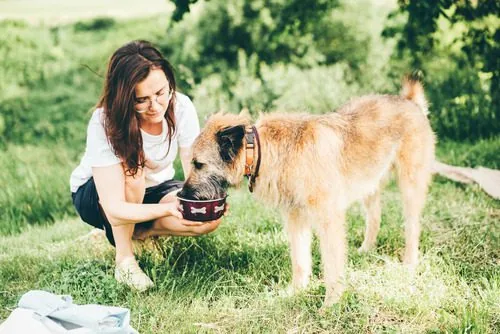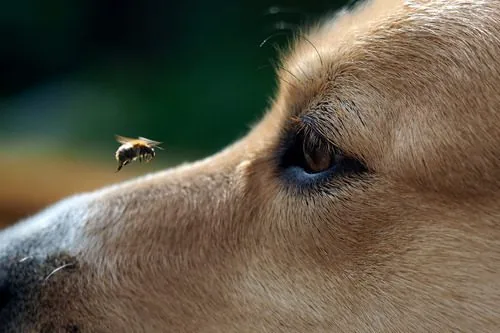Can Dogs Get Sunburn?
As summer approaches and the days get longer, many pet owners look forward to spending more time outdoors with their furry companions. However, while we often take precautions to protect ourselves from the sun’s harmful rays, it’s important to remember that our pets also need protection. This blog will address a common concern among pet owners: can dogs get sunburn? We’ll explore the symptoms of sunburn in dogs, the risks associated with too much sun exposure, when to seek veterinary attention, and practical steps you can take to prevent sunburn in your dog. For any concerns or to schedule an appointment, contact Boughton Square Animal Clinic at (630) 759-0093.

Symptoms of Dog Sunburn
Just like humans, dogs can suffer from sunburn, and recognizing the symptoms is crucial for their well-being. Sunburn in dogs often appears as red or pink skin, especially in areas with thin fur or no fur at all, such as the nose, ears, belly, and groin. Here are the common symptoms to watch for:
- Redness and Inflammation: One of the first signs of sunburn in dogs is redness and inflammation. The affected areas may appear more vibrant and swollen than usual. This can be especially noticeable in dogs with light-colored or thin fur.
- Peeling and Flaking: Sunburn can cause the skin to peel and flake, similar to how human skin reacts. You might notice your dog’s skin becoming dry and shedding more than normal.
- Sensitivity and Pain: Dogs with sunburn may exhibit signs of discomfort when touched. They might shy away from being petted in affected areas or show signs of pain when these areas are handled.
- Blisters: In severe cases, sunburn can lead to blistering. Blisters are a sign of more serious skin damage and should prompt immediate veterinary attention.
- Behavioral Changes: Your dog might also exhibit behavioral changes due to the discomfort of sunburn. They might become less active, more irritable, or show reluctance to go outside.
Risks of Too Much Sun Exposure to Dogs
Prolonged sun exposure can pose significant risks to dogs, going beyond mere sunburn. Understanding these risks can help you take better care of your pet.
Skin Cancer
One of the most serious risks of excessive sun exposure is the development of skin cancer. Dogs, particularly those with light-colored or thin fur, are at higher risk. Malignant melanomas, squamous cell carcinomas, and hemangiomas are types of skin cancer that can develop due to UV exposure.
Heatstroke
Excessive sun exposure can also lead to heatstroke, a life-threatening condition. Symptoms of heatstroke include excessive panting, drooling, vomiting, diarrhea, and collapse. Immediate veterinary care is essential if heatstroke is suspected.
Dehydration
Spending too much time in the sun can lead to dehydration. Ensure your dog always has access to fresh water, especially during hot weather. Signs of dehydration include dry gums, sunken eyes, and lethargy.
Eye Damage
Just like humans, dogs’ eyes can be damaged by UV rays. Prolonged exposure can lead to conditions like cataracts or other eye issues. Protecting your dog’s eyes with specially designed dog goggles can help mitigate this risk.
Immune System Suppression
Chronic exposure to UV rays can suppress your dog’s immune system, making them more susceptible to infections and other health problems.
When to Seek Veterinary Attention
If you notice severe sunburn symptoms in your dog, such as significant redness, blisters, or peeling, or if symptoms persist or worsen over a few days, seek veterinary care from Boughton Square Animal Clinic at (630) 759-0093. Additionally, any unusual growths, lumps, or non-healing sores should be examined promptly, as early detection of skin cancer improves treatment outcomes. Immediate attention is also crucial for heatstroke symptoms like excessive panting, drooling, vomiting, or collapse, as heatstroke is a medical emergency.
Preventing Sunburn in Dogs
Preventing sunburn is the best way to protect your dog from the harmful effects of the sun. Here are some practical steps you can take to keep your pet safe.
- Use Pet-Safe Sunscreen: Applying pet-safe sunscreen to areas with little or no fur can help prevent sunburn. Focus on the nose, ears, belly, and other vulnerable spots. Avoid using human sunscreen, as it can contain ingredients harmful to dogs.
- Provide Shade & Water: Ensure your dog has access to shaded areas when spending time outdoors. A shaded area can provide a cool retreat from the sun’s rays and help prevent overheating. Provide fresh water for your dog and carry a portable water bowl when you’re out and about to ensure your dog stays hydrated.
- Limit Sun Exposure: Avoid letting your dog spend too much time in direct sunlight, especially during peak hours between 10 a.m. and 4 p.m. Plan outdoor activities for early morning or late afternoon when the sun’s rays are less intense.
- Protective Clothing: Consider using protective clothing designed for dogs, such as UV-protective shirts or hats. These can provide an extra layer of protection for your dog’s skin.
Keeping Your Dog Safe from the Sun’s Harmful Rays
Sunburn is a real concern for dogs, just as it is for humans. By recognizing the symptoms, understanding the risks, knowing when to seek veterinary care, and taking preventive measures, you can keep your dog safe and healthy during sunny days. If you have any concerns or need advice, contact Boughton Square Animal Clinic at (630) 759-0093 or make an appointment. Your dog’s health and well-being are our top priorities, and we’re here to help you enjoy many safe, sunny days together.
Recent Posts
6 Possible Causes for Your Cat’s Sneezing
6 Possible Causes for Your Cat’s Sneezing Cats are known for their curious and playful nature, but…
Why is My Dog Eating Grass?
Why is My Dog Eating Grass? Dogs are known for their curious behaviors, and one that often…
Can Dogs Eat Marshmallows?
Can Dogs Eat Marshmallows? Marshmallows are a popular treat for many people, but pet owners often wonder,…
Dog Dehydration: Symptoms, Treatment and Prevention
Dog Dehydration: Symptoms, Treatment and Prevention Dehydration in dogs is a common but often overlooked condition that…
What To Do If Your Dog is Stung by a Bee
What To Do If Your Dog is Stung by a Bee As warmer weather arrives and outdoor…
About Boughton Square Animal Clinic
Since 1979, Boughton Square Animal Clinic has served Bolingbrook, IL and surrounding communities as both a veterinary care provider and a devoted partner in treating your animal family members for life.






